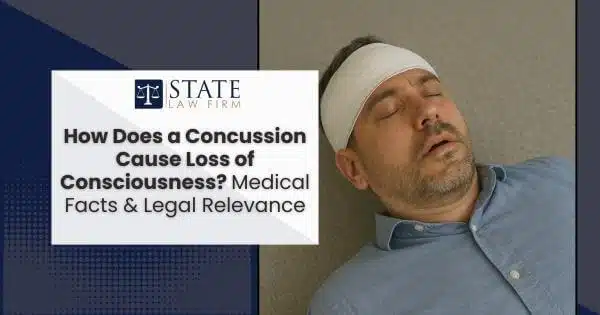Concussions are among the most misunderstood—and underestimated—types of brain injuries. While many people associate concussions with a simple bump on the head, the reality is far more complex. A concussion is a form of traumatic brain injury (TBI) that can disrupt normal brain function in profound ways, sometimes leading to loss of consciousness and a wide range of lingering symptoms that can impact every aspect of daily life.
According to the Centers for Disease Control and Prevention, an estimated 2.8 million Americans sustain a traumatic brain injury each year, with concussions accounting for a significant share of these cases. Whether caused by a car accident, a fall, or a sports injury, concussions deserve careful medical attention. When negligence is involved, it also has profound legal implications for victims and their families.
At State Law Firm, our dedicated team of young attorneys is committed to helping clients navigate the aftermath of head injuries with clarity and confidence. From understanding the mechanism of injury to evaluating long-term effects and pursuing fair compensation, informed clients are empowered to make informed decisions. If you’re dealing with a concussion from a vehicle collision, you can learn more about your options by visiting our Sherman Oaks car accident lawyer page. And for a deeper dive into the potential long-term impact of traumatic brain injuries, explore our resource on the long-term effects of TBI.
In this guide, we’ll break down the medical facts behind concussions and loss of consciousness, outline the symptoms to watch for, and explain how these injuries can shape the outcome of a personal injury claim. Whether you’re a patient, a loved one, or simply looking to understand the science, this article will help you make sense of a challenging topic—and take informed steps toward recovery and justice.
Understanding Concussions: Definition and Mechanism of Injury
A concussion is a type of traumatic brain injury (TBI) that occurs when a sudden impact or jolt causes the brain to move within the skull. This movement can lead to chemical changes in the brain and damage to brain cells, resulting in a range of symptoms that may appear immediately or develop over time.
Common causes of concussions include:
- Car accidents
- Falls, especially among older adults and young children
- Sports injuries
- Physical assaults
Mechanism of Injury:
When the brain accelerates and decelerates rapidly—sometimes hitting the inside of the skull—neural pathways can stretch and temporarily lose their ability to function normally. This disruption is what leads to many of the classic signs of concussion, including confusion, headache, and dizziness.
Pro Tip: Even if you don’t lose consciousness, any significant blow to the head warrants medical evaluation. Concussions don’t always cause immediate symptoms.
The Science Behind Loss of Consciousness Due to a Concussion
One of the most alarming effects of a concussion is loss of consciousness. This can range from a few seconds of confusion to several minutes of unresponsiveness.
Why does this happen?
- A concussion disrupts normal brain function by altering the balance of neurotransmitters and ions within the brain.
- Rapid shifts in the brain can interrupt electrical activity in areas responsible for awareness and alertness.
- This disruption leads to what’s sometimes called a “brief shutdown,” causing a temporary loss of consciousness.
Even if consciousness returns quickly, the incident is a clear sign that the brain has been injured. Prompt evaluation and documentation are crucial, especially if legal action may be necessary in the future.
Identifying Signs and Symptoms Associated with Concussions
Concussion symptoms can vary widely, making it essential to recognize both evident and subtle signs.
Physical Symptoms:
- Headache or pressure in the head
- Nausea or vomiting
- Dizziness or balance problems
- Sensitivity to light or noise
Cognitive Symptoms:
- Confusion or feeling “foggy”
- Difficulty concentrating
- Memory loss around the time of injury
Emotional and Behavioral Symptoms:
- Irritability or mood swings
- Anxiety or depression
- Changes in sleep patterns
Pro Tip: If you notice any of these symptoms in yourself or a loved one after a head injury, seek medical attention right away. Early intervention can prevent complications.
The Role of Medical Professionals in Diagnosing and Treating Concussions
Medical evaluation is the cornerstone of concussion care. Doctors will typically:
- Conduct a neurological exam to check balance, reflexes, and coordination
- Use cognitive tests to assess memory and concentration.
- Review symptom history and mechanism of injury.y
- Order imaging tests (like CT scans) if there are red flags, such as prolonged unconsciousness or worsening symptoms
Treatment usually involves:
- Rest and limited screen time
- Gradual return to daily activities as symptoms improve
- Close monitoring for post-concussion syndrome
Neurologists and other specialists may be involved in cases that are persistent or severe.
If someone else’s negligence caused your concussion—like a reckless driver or unsafe premises—timely documentation of your diagnosis can be a vital piece of evidence.
The Legal Implications: How Concussions Impact Personal Injury Cases
In personal injury law, proving a concussion requires more than just stating you hit your head. Insurance companies often challenge these claims because concussions are “invisible injuries.”
Key factors that strengthen a claim include:
- Prompt medical evaluation and diagnosis
- Detailed records of symptoms and treatment
- Expert testimony from neurologists or concussion specialists
- Evidence linking the injury to a specific accident
Concussions can have a significant impact on daily life, affecting work, relationships, and overall well-being. Compensation in a personal injury case may cover:
- Medical expenses
- Lost wages
- Pain and suffering
- Ongoing rehabilitation
If you have questions about how your concussion may factor into a legal claim, our team is here to help you understand your rights and explore your options. You can also learn more about car accident claims involving brain injuries.
Coping with the Aftermath: Long-term Effects and Recovery from a Concussion
While many people recover fully from a concussion within weeks, others experience long-term symptoms, sometimes referred to as post-concussion syndrome (PCS).
Potential long-term effects:
- Persistent headaches
- Memory problems
- Difficulty concentrating
- Mood disturbances
Recovery is a gradual process. It may involve:
- Structured rehabilitation programs
- Cognitive therapy
- Support from family and healthcare professionals
For additional insights on what long-term recovery can look like, visit our guide to the long-term effects of traumatic brain injury.
Remember: You don’t have to face recovery alone. Whether you need help navigating medical care, understanding insurance issues, or pursuing a legal claim, State Law Firm is dedicated to standing by your side every step of the way.


